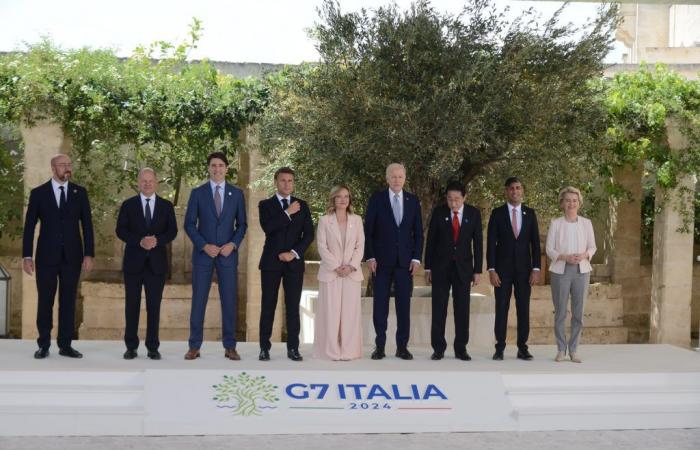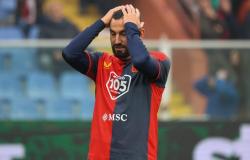The eyes of the world are focused on Puglia where, even before starting their summit, the G7 leaders reached a agreement on sending Ukraine 50 billion dollars by the end of 2024. The sum will be financed with interest generated by Russian assets frozen in Europe since the start of the invasion. The indiscretion was confirmed this morning by various diplomats according to whom there is a general agreement on the issue which must now be ‘put to the ground’ so that it complies with international rules and treaties in order to avoid capital flight deposited in Europe from third countries. In addition to Ukraine, a priority topic, the Big 7 will discuss the challenges in a rapidly changing international scenario marked by numerous crises. These include immigration, the partnership with Africa, the war in the Middle East, the climate crisis and the exploitation of resources and artificial intelligence. This morning, Italian Prime Minister Giorgia Meloni welcomed US President Joe Biden, British Prime Minister Rishi Sunak, French President Emmanuel Macron, German Chancellor Olaf Scholz, Japanese Prime Minister Fumio Kishida and the Canadian one, Justin Trudeau. For the first time the G7 is also attended by a pontiff, Pope Francis, and the leaders of other countries including the Ukrainian president, Volodymyr Zelensky, the crown prince of Saudi Arabia Mohammed bin Salman, the Indian prime minister Narendra Modi, the Argentine Javier Milei and the Brazilian Luiz Inácio Lula da Silva. ‘There is a lot of work to do – said Meloni – but I am sure that in these two days we will have discussions that will lead to concrete and measurable results.’
Support Africa and contain Beijing?
The attention that Italy wanted to reserve for Africa and the countries of Global South is confirmed by the high number of African governments and heads of state present at the summit. Among others are Mohamed Ould Ghazouani, president of Mauritania and rotating president of the African Union, Kais Saied, president of Tunisia, Abdelmadjid Tebboune, president of Algeria, William Ruto, head of state of Kenya, and Akinwumi Adesina, president of the African Development Bank. It is foreseeable that among the issues on the table there is the relief of the debt that weighs on African countries but it is above all on the so-called Mattei Plan that the Italian prime minister will focus her attention. “The project – writes al Jazeera – embodies his vision of projecting power in Africa and transforming Italy into a bridge for the distribution of gas from the continent and the Mediterranean to the rest of Europe, as well as supporting economic growth to stem mass migration”. There are also 7 leaders on the table the question of relations with China and in particular how to limit Chinese exports of ‘dual use’ products to Russia. The United States has already announced countermeasures to punish Chinese companies and banks that allow Moscow to evade sanctions. But the issue of relations with Beijing divides Washington from its European allies, who are cultivating fruitful economic relations with China with which they want to avoid a trade war dynamic.
Trump-proof deals?
The anti-Putin alliance will materialize in Borgo Egnazia also with the signing of a bilateral security agreement between Ukraine and the United States: a 10-year agreement with which Washington undertakes to supply Kiev with military assistance and equipment. As with other bilateral pacts already signed by Ukraine, the agreement will not require America to intervene in defense of its ally in the event of an attack, but aims to also commit future US administrations to supporting Ukraine. Introducing it, US National Security Advisor Jake Sullivan said: “By signing this pact, we are sending Russia a signal of our resolve. If Vladimir Putin thinks he can survive the coalition supporting Ukraine, he is wrong.” Officials said they hope the deal transcends political divisions within the United States, but acknowledged that Trump or any future president could withdraw from the deal because it is not a treaty and will not be ratified by Congress. Another key US initiative – announced on the eve of the summit – concerns the widening of the sanctions framework and in particular the secondary ones to all companies, including banks, that they support the “Russian war economy”. The increase – explains the New York Times – aims to hit above all the network of countries that from the Balkans to the Middle East and Central Asia act as mediators to circumvent the sanctions.
Italian exception?
As far as possible, the G7 would also like its decisions to be Trump-proof. The uncertain result of the US elections in November, in fact, weighs on Western coalition grappling with the risks of an abrupt change of direction in Washington. Many of the leaders gathered in Puglia are already grappling with their problems: if in France, Emmanuel Macron is fresh from an electoral defeat in the European elections which convinced him to call early elections, the conservative prime minister Rishi Sunak in the United Kingdom is practically certain of having to say goodbye to Downing Street after the 4 July vote. Parties supporting German Chancellor Olaf Scholz got a bad result in the European elections, while Justin Trudeau, Canada’s prime minister for nine years, has spoken openly about leaving his job and Japan’s Fumio Kishida faces a fierce leadership competition later this year. The exception is the only one Giorgia Meloni which according to much of the foreign press is looking for its own in Puglia consecration on the international scene. “The weakened leaders of the West gather in Italy to discuss an ungovernable world” writes the New York Times and while for the Guardian “all eyes are on her”, the European edition of Politico dedicates an article to the Apulian G7 with the lapidary title: “Six lame ducks and Giorgia Meloni: This week’s meeting of the G7 leaders in Italy is more like the Last Supper than a demonstration of Western power”.
The comment
By Antonio Villafranca, Vice President for Research, ISPI
“The Apulian stage of the G7 seems to be in excellent shape. It is so due to the breadth of the topics covered: from security (with an important step forward regarding the use of frozen Russian assets) to Africa, from migration to AI. And it is also the case for the number and level of political leaders who are participating. It’s almost reminiscent of a G20 minus China, Russia and India. Of course, things change when you look at the results. Something is being achieved but it is objectively difficult to be ambitious if the leaders of the southern hemisphere present in Puglia (from Modi to Lula) know well that their interests go well beyond the G7 countries, and if the unity of purpose among them G7 countries is less solid than it appears. And who knows what could happen next year if Trump returns to the White House and the G7.”






